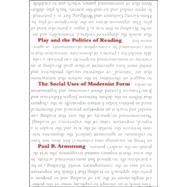Play And The Politics Of Reading
, by Armstrong, Paul B.- ISBN: 9780801443251 | 0801443253
- Cover: Hardcover
- Copyright: 2/24/2005
Classrooms and curricula should be structured to foster the playful interaction that can teach students how to negotiate social and political differences in an emancipatory, noncoercive manner. . . . Teaching reading as a playful exercise of reciprocity with otherness can help prepare students for a democracy understood as a community of communities.-from the "Pedagogical Postscript" Reading is socially useful, in Paul B. Armstrong's view, and can model democratic interaction by a community unconstrained by the need to build consensus but aware of the dangers of violence, irrationality, and anarchy. Reading requires mutual recognition but need not culminate in agreement, Armstrong says; instead, the social potential of reading arises from the active exchange of attitudes, ideas, and values between author and reader and among readers. Play and the Politics of Reading, which has important implications for education, draws on Wolfgang Iser's notion of free play to offer a valuable response to social problems. Armstrong finds that Joseph Conrad, E. M. Forster, Henry James, and James Joyce provide apt examples of the politics of reading, for reasons both literary and political. In making the transition from realism to modernism, these authors experimented with narrative strategies that seek simultaneously to represent the world and to question the means of representation itself. The formal ambiguities and complexities of such texts as Howards End and Ulysses are ways of staging for the reader the difficulties and opportunities of a world of differences. Innovative formal structures challenge readers to reconsider their assumptions and beliefs about social issues.






